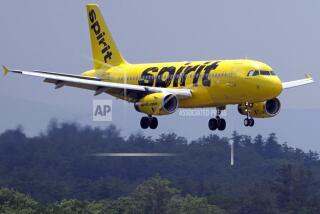British Airways Suspends Plans to Purchase More of USAir : Transportation: The move comes after the struggling U.S. carrier said its losses might top last year’s $350 million.
- Share via
Alarmed by its partner’s mounting financial problems, British Airways on Monday suspended plans for any further investment in USAir after the U.S. carrier said its pretax losses this year might top the $350 million reported in 1993.
British Airways, which has already invested $400 million in USAir, said it will put its investment plans on hold until the Arlington, Va.-based airline cuts costs and improves its financial performance. The British carrier’s decision will lead other foreign carriers to more carefully scrutinize any future investments in U.S. carriers, analysts said.
“The problem is that USAir is losing its shirt . . . and its long-term future of feeding British Airways passengers is in doubt,” said airline industry analyst David Hoppin.
USAir blamed the expansion of low-fare, low-cost carriers as well as weather-related disruptions for a projected $200-million pretax loss during the first three months of this year. The nation’s sixth-largest carrier said pretax losses for the year could exceed $350 million if it fails to make dramatic changes in the way it operates.
After releasing the grim financial forecasts, USAir executives on Monday approached union leaders about beginning negotiations to cut the pay and raise the productivity of workers. Airline and union officials were not available to discuss the outcome of Monday’s meetings.
USAir, which has the industry’s highest operating costs, said such changes are needed for it to compete against low-cost carriers such as Southwest and Continental airlines.
“The principal cause of our unacceptable loss is the requirement to sharply lower fares in response to the steady expansion of low-cost carriers into many of our East Coast markets,” USAir Chairman and President Seth E. Schofield said in a statement.
For example, USAir has cut fares 60% on routes from Baltimore to Chicago and Cleveland since Southwest began offering competing service last fall, travel agents said. “It has butchered its pricing,” Charles Roumas, vice president of marketing for Travel One, said of USAir.
Last year, British Airways paid $400 million for a 24% stake in USAir as part of its strategy of tapping into large domestic markets to feed its extensive network of international routes. The London-based carrier said it had originally planned to invest an additional $450 million over five years and increase its stake in USAir to 44% if efforts succeed to get Congress to allow greater foreign ownership of U.S. carriers.
The suspension of British Airways’ investment in USAir comes less than two weeks before the U.S. government will decide whether to renew approval of a key element of the airlines’ alliance: code sharing.
Code sharing allows flights flown by two separate carriers to appear in airline computer reservation systems as being operating by a single airline. The arrangement gives a code-share flight preferential treatment over competing connecting service and allows two carriers to more easily feed each other traffic.
While British Airways has put its investment plans on hold, it wants to continue expanding its code-sharing relationship with USAir--if the U.S. government agrees. Both airlines serve 34 U.S. cities under code-sharing agreements and want to expand that number to 63 by the end of June.
Some industry observers speculated that British Airways’ announcement may have been timed to influence the U.S. government’s decision. But executives for the airline denied such comments, saying it was only reacting to USAir’s deteriorating financial picture.
British Airways has not been the only foreign carrier to have financial problems with a U.S. partner. KLM Royal Dutch Airlines last year had to write off more than $400 million invested in Minneapolis-based Northwest Airlines, which is emerging from deep financial problems.
Many foreign carriers have underestimated the dramatic changes that conventional U.S. carriers--such as USAir--must make to survive in an era of low fares on low-cost airlines.
Those pressures might lead larger, established airlines to concentrate on long-distance routes while ceding the shorter routes to low-fare carriers.
“It will make (foreign carriers) look more carefully at what type of carrier that they want to be allied with,” said Clifford Winston, who studies the industry as a senior Brookings Institution fellow.
On the New York Stock Exchange Monday, USAir’s stock fell $1.25 a share to $9. British Airways’ American depository receipts fell 75 cents to $63.50.
More to Read
Inside the business of entertainment
The Wide Shot brings you news, analysis and insights on everything from streaming wars to production — and what it all means for the future.
You may occasionally receive promotional content from the Los Angeles Times.










